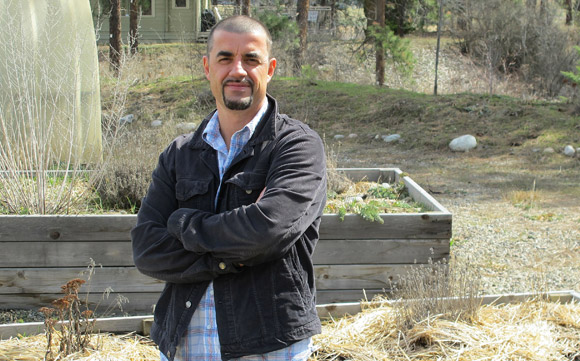
Sociology professor Luis L. M. Aguiar is studying how climate change is impacting labour processes in the corporate agricultural food industry.
UBC professor joins Work in a Warming World project
Luis L. M. Aguiar, associate professor of sociology at UBC’s Okanagan campus, will study the agricultural food (agrifood) industry with a focus on the Okanagan and Fraser Valleys as part of the Work in a Warming World project.
Led by York University, Work in a Warming World is investigating how workplaces of every size and type produce greenhouse gas emissions and how they can help to contain global warming. The project is developing ongoing dialogue between climate scientists, workplaces, academic researchers, community and non-governmental organizations, to investigate how well Canadian workplaces are assessing and responding to the impact of climate change, and propose solutions to limiting their contribution to greenhouse gases.
Aguiar’s research will look at how climate change is impacting labour processes in the corporate agrifood sector, with emphasis on the greenhouse industry, and how corporations are attempting to minimize or reduce risk associated with environmental uncertainty. He says there are many aspects of climate change that could impact how agrifood businesses operate.
“Agriculture in the Okanagan and Fraser Valleys depends on and is affected by many factors,” he says. “Temperature, moisture, growing season, secure export markets, and a low-wage labour supply are all important to the success of the agrifood industry. Climate change could potentially alter one or all of these, and we want to know if agro-corporations will continue to rely on foreign workers and if they will modify labour practices to offset the risk of climate uncertainty.”
Aguiar’s study is partially funded through a $7,500 Community-University Research Alliances (CURA) grant from the Social Science and Humanities Council of Canada. The grant will cover the cost of research supplies and a master’s student to assist with the project for the upcoming summer and fall semesters. This first phase of the research will include a literature review of what has already been done to study the greenhouse industry.
From this, Aguiar and his team will prepare a working paper which will be presented at the Work in a Warming World annual meeting this fall. The next phase of his research will include on-the-ground interviews with greenhouse industry professionals.
Research by Aguiar and others working on the Work in a Warming World project will be collected and shared through academic channels, websites, and blogs. It will be used to promote dialogue among communities, industry and political decision-makers, and inform the Canadian public about how various Canadian industries and workplaces are responding to climate change.
For more information on the Work in a Warming World project, visit www.workinawarmingworld.yorku.ca/.
— 30 —